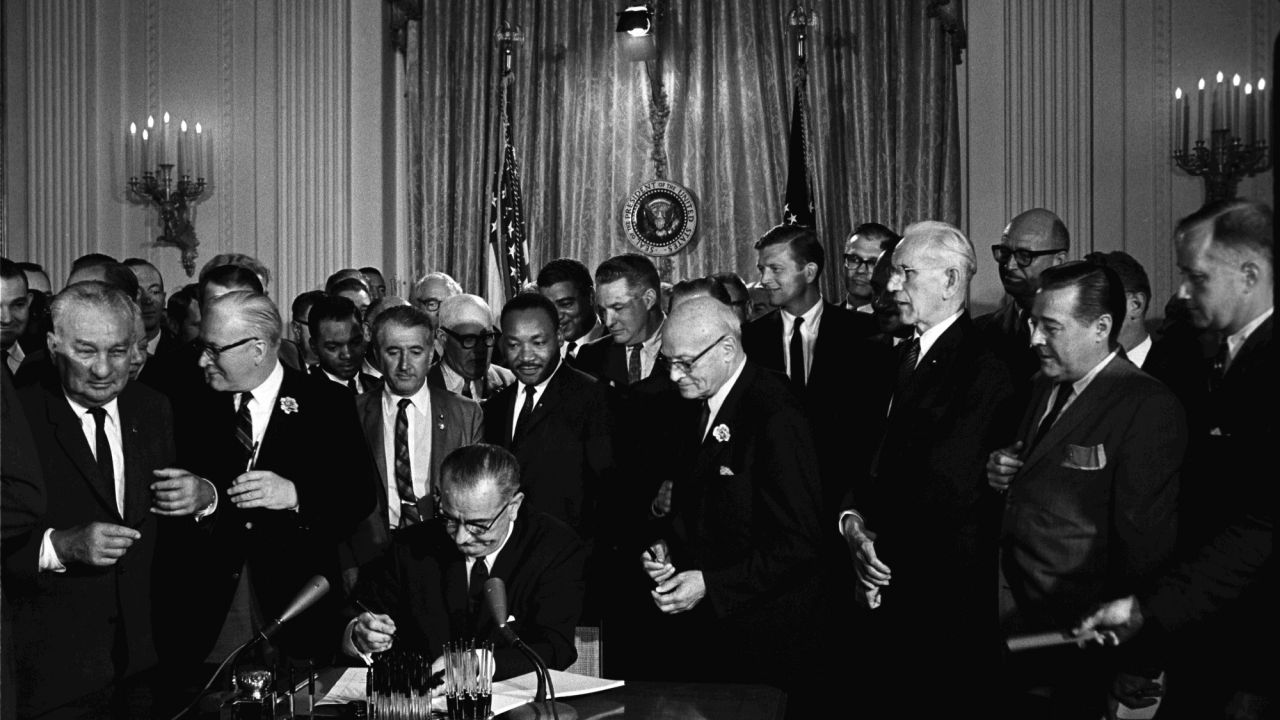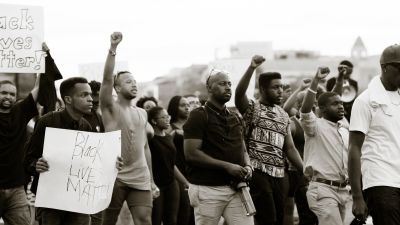
President Johnson signing the Civil Rights Act of 1964. (Photo courtesy of the National Archives and Records Administration)
Roughly two years ago, Donald Trump descended his gold-plated escalator in Trump Tower and declared that he (and he alone) would Make America Great Again. Throughout the course of his campaign and extending into his presidency, Trump has promised to undo all of the ills of the Obama era, kick out “illegals” (all of whom seem to be murderers, rapists, terrorists, job thieves or a combination thereof) and restore America to the great nation she used to be. He even promised to bring back saying “Merry Christmas.” Significantly, Trump has gone out of his way to establish an election commission to prove what he believes is rampant voter fraud. When assessing the litany of Trump promises and proposed policies, they are not so much an undoing of Obama’s legacy, but rather in direct contrast to the civil rights gains achieved under Lyndon Johnson just over 50 years ago.
The Civil Rights Act of 1964, the Voting Rights Act of 1965 and the Immigration Act of 1965 are a triumvirate of measures signed and implemented by President Lyndon Johnson as the core of his presidential policy. The acts of Trump and his team should be seen as no less than a modern-day attack on 21st-century civil rights, voting rights and inclusive immigration efforts that were guaranteed under that legislation.
— Lyndon Johnson
Signed just after President Johnson assumed the presidency in 1964, the Civil Rights Act signaled a mid-20th century commitment to uphold equal protections of all citizens. The landmark legislation outlawed discrimination based on race, color, religion, sex or national origin. In 1965, Johnson followed with the Voting Rights Act, which upheld the civil rights protections and also expanded rights and liberties of blacks and other nonwhite groups living in the US. Of course, these rights had been laid out in the 14th and 15th amendments to the Constitution, but it took roughly 100 years for those rights to begin to manifest themselves. It was LBJ’s maneuvering with Congress that secured (at least on paper and by law) voting rights for racial minorities, especially in the South. LBJ also shepherded through the Immigration and Naturalization Act of 1965, abolishing the earlier quota system based on national origin and establishing a new immigration policy based on reuniting immigrant families and attracting skilled labor to the United States.
Johnson signed these landmark bills into law as part of his Great Society, and argued that “a man without a vote is a man without protection.” Trump’s draconian efforts to eliminate millions of Americans from the voting and registration rolls, a central tenant of his electoral plan, should be seen as a direct assault on the Voting Rights Act of 1965. The Voting Rights Act is often heralded by the Department of Justice as the most significant and effective piece of legislation ever enacted.
In order to see the methodical dismantling of American democracy under this current regime, we must view the successful passage of all three acts as building blocks toward the collective legislative progress and increased incorporation for blacks and other racial minorities living in the US. Essentially, dismantling the Voting Rights Act significantly unravels the Civil Rights and Immigration acts as well. The Voting Rights Act ensures that millions of American citizens have the legal right to register, vote and participate in free and fair elections. As the US attempted (and still attempts) to fully integrate all into its electoral process the expansion of civil rights was further expanded to include racial minorities, and black Americans in particular. Similarly, an attempt to erode voting rights directly affects immigrant groups and the strides made through the Immigration Act to fully incorporate them as citizens into the electoral process and to help them realize their full civil rights under the law.
The principles and tenets of all three acts are manifestly still a work in progress and under the Trump administration are on even more fragile ground. It comes as no surprise that voting equity and transparent immigration efforts would be in the crosshairs of this administration. A recent report stated that arrests of immigrants under the Trump administration have almost doubled in the past six months. Additionally, rates of Americans removing themselves from voting rolls have increased. Kris Kobach, the vice chairman of the new Presidential Advisory Commission on Election Integrity has prided himself on his downsizing of voter rolls in his home state of Kansas. Trump and Kobach’s intimidation tactics appear to be working, scaring Americans and their families into the shadows and away from the electoral process.
Although these three acts passed in the mid-1960s, all three acts remain relevant in the 21st century largely because the equal protections, franchise and robust and equitable immigration practices have yet to be fully realized for many people of color currently living in the US. LBJ was cognizant that the passage of legislation that would be perceived as assisting blacks and other marginalized groups could signal the exit of Southern Democrats from the party, possibly forever. In many ways, LBJ’s fears were realized. Currently, all but one of the senators are Republican representing Southern states, and Southern statehouses are solidly Republican.
Trump does not share the concerns of LBJ. He does not care that his policies and appointments contribute to the unraveling of inclusive acts passed just over 50 years ago. What he does care about is admiration — and as long as his loyal base continues to cheer when he denounces civil rights for others at home and abroad, repeat baseless claims of voter 2016 fraud and tout his Muslim ban and Mexican wall, we are in for a long three and a half years — and in grave jeopardy of losing not just the South, but progress toward US democracy forever.
This post is part of a three-part series in which historians examine Donald Trump’s plans to “Make America Great Again” and consider what point in American history President Trump was thinking about when he said “again.” Clearly, different voters heard different things. Now that we’re more than six months into his presidency, these historians review his legislation and policies and explain where that might place us in the past. Read other posts in the series.




